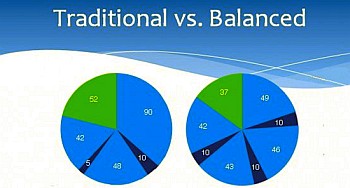 01/31/14 With only a few days until the first of three public meetings hosted by the Plymouth Schools to gather input and answer questions concerning the possibility of changing the school’s calendar to a balanced calendar for the 2015-2016 school year, administrators continue to provide information on the proposal.
01/31/14 With only a few days until the first of three public meetings hosted by the Plymouth Schools to gather input and answer questions concerning the possibility of changing the school’s calendar to a balanced calendar for the 2015-2016 school year, administrators continue to provide information on the proposal.
A balanced calendar would factor in two-week breaks in the fall, winter, and spring along with a summer break to give students extended breaks and give teachers time to offer remediation for struggling students. If adopted, the new scheduling would mean that the summer break would go from ten weeks to eight weeks. According to Plymouth Schools Superintendent, Daniel Tyree, the school year would likely start a week earlier than usual in August and end close to the same time in June.
Tyree said, “This is a consideration that several area superintendents began talking about over six years ago.” He said, “At that time there weren’t many schools using a balanced schedule and there was very little data to verify effectiveness.” Tyree said a major consideration was also how changing schedules would effect vocational co-op education classes. However, when those offering vocational classes completed a survey, eight of the ten indicated that they wanted go to a balanced schedule. “We have a couple of hundred kids in vocational classes now.” Tyree said.
Tyree said the Rochester Schools have been using a balanced schedule for a number of years. He said, “They report an increase in both attendance and state testing scores and a decline in disciplinary referrals.”
Tyree said over the years they have discussed the matter with teacher’s union representatives and school boards. “A committee meeting monthly on a number of topics has had balanced scheduling on the agenda almost every time.” he said.
Futurist David Houle has also held meetings with superintendents to help them track trends in education. Houle is considered by many as the number one futurist in the country and is often consulted by school boards for strategic planning. Houle said since there is a shift from the need for agrarian culture to digital learning along with the use of school vouchers, it makes sense to go to a balanced schedule.
Tyree said there are still several questions to be considered, including transportation for those students in remediation classes and how the schools can help parents/guardians with child care during breaks. Tyree said, “We have not discussed child care in depth, but I can see how we could enter into partnerships with our current before and after school program and the Boys and Girls Club.”
Tyree said the committee sees a balanced schedule as a way for families to plan vacations or other activities. He said, “Rates for some vacation designations are significantly cheaper in the off months and families could afford to do more.” He added, “Even if a student is in the remediation classes, families would still have nine days free for activities.”
The new type of scheduling being considered is not the same as year round school, according to information displayed on schools websites. If adopted, the number of days in school would remain at 180, the number required to meet state mandates.
Argos, Culver, John Glenn, Knox, North Judson, Oregon-Davis, Plymouth and Triton School Corporations have scheduled a series of meeting to gather public input and answer questions on a balanced schedule that could be implemented for the 2015-2016 school year.
Presentations during information sessions could answer concerns by parents and other community members on the possible impact on athletic events, summer jobs for students or teachers, transportation, required attendance, conflicts with special education of vocational education classes, and host of others.
The first ones scheduled are in Plymouth on February 5 at Riverside Intermediate, February 10 , Menominee Elementary, and February 11, Plymouth High School. All three will begin at 6:30 P.M. and are open to the public.














